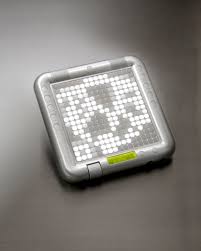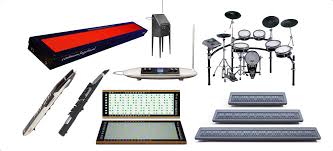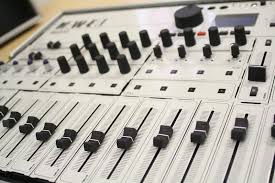MIDI Products
MIDI Hardware &
Software
MIDI
makes a lot of things possible, and there are many types of
MIDI product available to help you create, control, or even
just listen to music. MIDI products tend to fall into one of
two categories:
Some MIDI
Products -- such as the typical keyboard synthesizer shown
on the right -- are both a controller and sound generator.
If you would like to make music with MIDI, we recommend you
visit a MIDI specialist to determine the right products for
you. Here are just some of the products that you may want to
consider.
Keyboards and modules:
Practically every musical keyboard sold today has MIDI
connections... from the $100 portables to $300,000 digital
grand pianos.
Wind controllers, MIDI
guitars & drums etc.:

You don't have to be a keyboard (piano) player to benefit from
MIDI. There are specially made MIDI wind controllers, MIDI
guitars, MIDI drums, even MIDI accordions. Since MIDI was
primarily designed for ‘keyboard players', these devices are
often referred to as 'alternate MIDI controllers.'
(Interested in MIDI Guitar? Check out Craig Anderton's
High-Tech Guitar forum over at Harmony Central.)
 Non-Traditional Controllers: Another category of "alternate
MIDI controllers" are those that don't mirror traditional
musical instruments. There are many people who feel that
traditional musical instruments are too hard to learn, or
limit their expression to "traditional" forms.
Non-Traditional Controllers: Another category of "alternate
MIDI controllers" are those that don't mirror traditional
musical instruments. There are many people who feel that
traditional musical instruments are too hard to learn, or
limit their expression to "traditional" forms.
MIDI controllers
come in a large variety of shapes and formats, and thanks to
motion and impact sensors just about anything can be made to
send MIDI data.

We've
compiled some examples of non-traditional controllers
here,
and some additional and unusual uses of MIDI
here.
Control Surfaces:
This type of ‘alternate MIDI controller' includes unique
products designed to trigger or modify notes on a
sound-engine, as well as products to remotely control the
settings of software or other hardware using knobs, sliders,
buttons, wheels, and joysticks that send MIDI Messages.

Lighting
Controllers: Many professional stage lighting controllers
allow external control of scene and program changes via
MIDI.
Computers
& Interfaces: Practically every computer made today
comes with the ability to play MIDI files, and can connect
to other MIDI gear with a PC-to-MIDI interface (connector)
available as an accessory. Professionals and amateurs alike
can compose, arrange, and record original music, or use the
computer to learn about music or how to play an instrument.
Software
applications: There are hundreds if not thousands
of software applications that involve MIDI, either actively
or passively. Included are MIDI Sequencers (now commonly
combined with audio recording into Digital Audio
Workstations or ‘DAWs'.), auto accompaniment applications,
notation programs, music teaching software, games, DJ/remix
environments, and more.
Software sounds: ‘Softsynths' or ‘software musical
instruments' started
to appear in the late 1990s. With the development of plug-in
architectures and virtual studio technology (e.g. VST, AU,
etc.) there has been an explosion of sound-generating
software products in both ‘new' and ‘vintage' styles.
Games:
Computer and video game music, now generally referred to as
game audio, began in the early days of MIDI and to
some extent, its history exemplifies both the creativity and
the limitations of ‘ MIDI music.'
Today, game music
delivers startling levels of ‘reality'. Both recorded music
and MIDI, are at the heart of most game audio developers'
systems.
Interactivity, however, is a current hot topic in the game
industry and MIDI's inherent flexibility coupled with
microscopic file sizes, makes it a natural choice for a new
generation of both hardware and software that puts control
of game music in the hands of the players.
MOBILE PHONES AND
MORE:
Although the trend in recent years has been towards ‘real'
(compressed) audio versions of popular hits, MIDI ring-tones
are still very popular for their ability to be changed in
any way imaginable, and many phones (especially "smart
phones") support downloadable games that benefit from the
compact size of MIDI data.

MIDI is a
trademark of MIDI Manufacturers Association Incorporated.
About MIDI -
Making Music with MIDI
- MIDI Controllers -
MIDI Products -
MIDI Glossary
-
MIDI Polyphonic
Expression (MPE)

